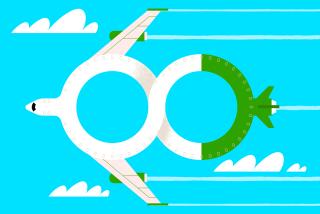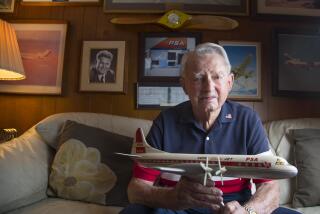People Express : Determined Fight to Pull Out of Dive
- Share via
NEW YORK — It was an idea whose time had come. Airlines had been deregulated and fares were no longer artificially propped up. Carriers could fly wherever they pleased--wherever there was business. Routes could be changed at will.
Three years after the 1978 deregulation act became law, People Express Inc. was born. Its name told it all: an airline for the masses. Its low fares would be cheaper than even the Greyhound bus and would enable everyone to fly , though without the usual comforts.
Today, People Express is in deep trouble and its survival is very much in doubt. It is losing money and has been so low on cash during the summer that its management has said all or part of the airline is for sale. And late last week, rumors revived that it was on the auction block because its wallet was nearly empty.
To stem the outflow, People Express is trimming its fleet, pruning its schedule and route system and is desperately trying to change its image from its original no-frills, low-cost, high-frequency concept to one closer to those of conventional carriers that put a high value on less-seasonal business travel.
“In a relatively short time,” said Anthony B. Hatch, airline analyst with Argus Research of New York, “People Express has gone from being an innovative start-up carrier to a widely analyzed success story to a financially troubled company. In our view, (there is) serious risk that the company will not be able to resolve its problems--and therefore will not survive.”
Louis Marckesano, airline analyst with Janney Montgomery Scott, a Philadelphia brokerage house, said: “If I were a betting man, I’d be betting against them.”
And, clearly, the odds are not in People Express’ favor.
After a summer in which the airline had only one month, August, during which it carried enough passengers to create a positive cash flow, it is estimated that it has only $25 million to $50 million left in the till. The airline would not reveal its current cash position, nor would it make any member of its management available for interviews for this article.
People Express had a $74.5-million loss in the second quarter of this year, an average daily loss of $819,000. At that rate, $25 million would last only a month.
However, Frontier Airlines, a subsidiary that has since gone into bankruptcy, contributed $32.7 million to the second-quarter loss. Without the burden of Frontier, People Express will be able to make its cash last a little longer.
In the first quarter of this year, People Express needed a load factor (percentage of seats filled) of 69.8% to break even, but its actual load factor was only 60.2%. Observers say the airline’s business is so cyclical that it traditionally has made money only in the summer vacation months. And it would cost an estimated $100 million, they add, to upgrade People Express to a full-service airline, a sum that just is not available.
Situation Could Worsen
“The time they have to make something happen is a function of how much cash they have,” John Pincavage, airline analyst with the Paine Webber brokerage, said. “If all of a sudden interest rates go up and start draining cash, and fuel prices go up and start draining cash, or the economy goes down and traffic drops and drains cash, the cushion is eaten up and they lose the time they need.”
Pincavage added that the adverse publicity People Express has had in recent months has hurt it both with the public and with travel agents, who do not like to make reservations on an airline that, they fear, may not be around for long.
What is the reason for the carrier’s troubles?
People Express simply grew too much too fast, and it underestimated the resolve of its competitors, the nation’s major airlines, to match its discount fares no matter how low they got.
Timothy Pettee, airline analyst with Bear, Stearns, a brokerage in New York, said: “While People Express was growing--and it was very successful in achieving its (growth) goals--the other airlines, American, United, Delta and Continental, had deeper pockets, and it was clear they were willing to test just how deep (People’s) pockets were. It has been a five-year war of wills to see who was going to buckle first.”
In its overambitious expansion program since its birth in 1981, People Express grew quickly from its origins: 250 employees and three airliners serving three cities. Today it has 80 planes, serves 49 cities and also owns two subsidiaries besides Frontier--Britt Airways in the Midwest and Provincetown-Boston Airline on the East Coast.
Will Have to Shrink
People Express boosted its capacity 124% in 1984 and 63% last year. But now, those who give People Express any chance to survive say that it will have to become a much smaller version of itself.
And that process has already begun. On Monday, People Express will stop service to five cities and plans to drop five more sometime soon. As a result, it will also reduce the number of its daily flights to 168 from 222. The airline is already leasing five of its 80 jets to Pan American World Airways; altogether, it plans to cut its fleet of 747 jumbo jets to five from eight and its number of smaller, three-engine 727 jets to 42 from 50.
Just how long People Express can hold on is a matter of speculation and depends essentially on how it makes it through the winter. But that will be tough. In its five-year history, People Express has never made any money between October and March, when the people who make up its largest single segment of passengers have put away their knapsacks and returned to classes.
“We do not expect this year to be any different,” said Helane Becker, airline analyst with Drexel Burnham Lambert, a New York brokerage house. “People Express’ fares are now higher than many of their competitors. People Express has been confusing its traditional passengers by its shift in strategy. Now that the company is upgrading to be a full-service airline, they are losing the niche they originally created. We believe that it will be touch-and-go for this company for the next several months.”
Improved Reservations
One change that People Express recently made might help improve its situation. Until recently, the only way to make a reservation on the airline was to call its offices, whose numbers were frequently busy. Now, the airline has joined the computerized reservation systems of five major carriers, allowing travel agents to make reservations more easily.
Travel agents had accounted for only about 20% of People Express’ reservations, in sharp contrast to the 80% range of most of the major airlines. Increased business through travel agents would do much to relieve People Express’ problems.
In retreating from some of its original no-frills marketing innovations, People Express has instituted a frequent-flier program, begun offering first-class service, stopped charging for baggage checking, improved its telephone reservation system, begun serving free food and added a ticket-by-mail service.
Making a Mistake
But there are those who think that People Express, in trying to change its image, is making a foolish mistake. “Coca-Cola had some trouble changing its product from Coke Classic to the new Coke,” Pettee, the Bear, Stearns analyst, said. “Eventually, it abandoned somewhat that effort.
“J. C. Penney Co. tried to go upscale. Burger King put in salad bars. It is very difficult to effect such . . . a change in the consumer marketplace.”
One reason that People Express expanded so much so quickly was that it wanted to use the 50 727 airliners that it acquired in 1983 from bankrupt Braniff Airlines in an effort to capture key markets from major airlines. People Express wanted to capture passengers and keep hold of them from the starting points of their trips to their final destinations.
And then, also toward that end, People Express took a giant but perhaps fatal step last November when it acquired Frontier for $309 million, of which a little less than $100 million was in cash. People’s intention was to have two hubs (Newark, N.J., and Denver) and to bridge them with 747 service.
But Frontier was located in the only American city where three carriers had hubs. Frontier was the smallest of the three and was the loser in a fierce fare war. It had high costs, but People Express attempted to transform it into a discount airline. The results were tragic.
Frontier lost millions of dollars every month. In the first quarter of this year, its break-even load factor was an extremely high 90%, 23 points above its actual load factor. As a result, Frontier lost about $60 million for People from the time it was purchased through in June.
In an attempt to save its own skin, People Express sought to unload Frontier. In July, People Express announced that it had agreed to sell Frontier to United Airlines for a badly needed $145 million. UAL immediately purchased some Frontier assets (gates and planes) for $58 million, and the rest was to follow when the Transportation Department and both airlines’ unions approved the deal.
But that was not to happen. United’s negotiations with the pilots union broke down over the issue of how long it would take to bring Frontier’s lower-paid pilots up to United’s pay scale. As a result, United pulled out of the deal and People Express had to seek protection from creditors of Frontier under Chapter 11 of the U.S. Bankruptcy Code.
Frontier has no cash and is given little chance of ever flying again. Its losses are continuing to mount--mainly lease and interest expenses--but it has no revenue to cover them.
And there have been other repercussions. Recently, Moody’s Investors Service, the stock and bond rating service, downgraded its rating of People Express’ stock and debt. Its action, Moody’s said, reflected the “continued cash-flow pressures and the Chapter 11 filing of Frontier Airlines.”
Stock Being Pressured
The agency said the canceled sale of Frontier “prevented the (People Express) holding company from obtaining a vital cash infusion,” which resulted in its omitting dividend payments on its preferred and common stock. “The airline stock is being pressured,” Moody’s added, “because of increased interest costs, reduced load factors (and) an inability to raise fares.”
There is still another obstacle facing People Express: The courts might make the airline a party to Frontier’s bankruptcy. Analyst Pettee said he has researched bankruptcy law, and it “specifically states that transactions that take place one year prior to a bankruptcy filing can be unwound by the bankruptcy court if it can be found that those transactions resulted in the insolvency of the company.”
He predicted that ultimately People Express will be held responsible for the debts of Frontier, which could pull People Express itself into bankruptcy.
Some analysts and other observers believe that the only way People Express can turn itself around would be to bring in new management. Its founder and chairman, Donald C. Burr, must go, these observers maintain.
“People Express is an entrepreneurial business,” Pettee said. “It must now become a mature growth company. It is very similar in that respect to Apple Computer, which started up around the same time People Express did and went public around the same time.
“Apple also had difficulties transforming itself from an entrepreneurial enterprise of Steven Jobs to a major force in the microcomputer industry. Finally, it changed managements, and today it is doing quite well as a much more mature company.
“People Express could stand to do the same thing. . . . In order to remain competitive in the airline business, it must change its approach.”
More to Read
Inside the business of entertainment
The Wide Shot brings you news, analysis and insights on everything from streaming wars to production — and what it all means for the future.
You may occasionally receive promotional content from the Los Angeles Times.









